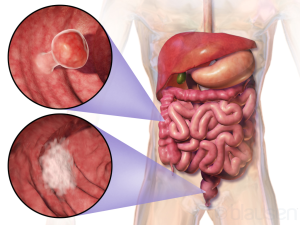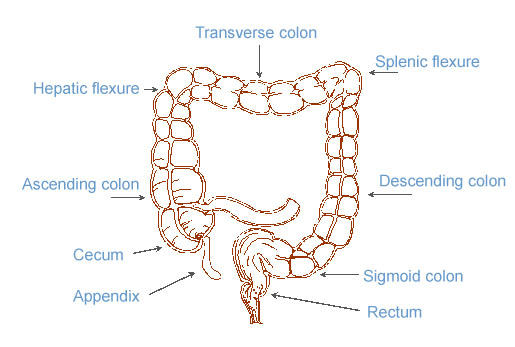Colorectal Cancer
Our surgical oncologists have specialized training and expertise in treating patients with all types of colorectal cancer – new diagnoses, advanced cases, and when recurrence occurs.
We provide services at Vancouver General Hospital and the BC Cancer Agency – offering consultation and surgery for patients from all regions of British Columbia and the Yukon.
 Colorectal cancer affects over 24,000 Canadians every year. The main treatment for colorectal cancer is surgery. Chemotherapy and radiation therapy are also used in some patients. Survival rates have been steadily improving since the 1980’s – due to improvements in all types of treatment, and possibly due to earlier detection.
Colorectal cancer affects over 24,000 Canadians every year. The main treatment for colorectal cancer is surgery. Chemotherapy and radiation therapy are also used in some patients. Survival rates have been steadily improving since the 1980’s – due to improvements in all types of treatment, and possibly due to earlier detection.
Most colon and rectal cancers can be detected when they are small. These patients can usually be treated with laparoscopic surgery and may not require any other treatments. Some colorectal cancers are larger when diagnosed. Sometimes they have grown into other organs or body parts (for instance, the stomach, pancreas, bladder, or muscles of the belly wall). These cancers are usually treated with a combination of surgery, radiation and chemotherapy. Our surgeons are experienced in designing the best treatment combination for each patient and performing the most suitable operation – either laparoscopically or through a more traditional open incision.
If a colon or rectal cancer grows back (recurs) after it is first treated, repeat surgery is sometimes recommended. This surgery can be difficult because of scar tissue from previous surgery, the effects of previous radiation and chemotherapy treatments, and the location of the re-growing cancer. Our surgeons are experienced in performing surgery in these complex situations.
Sometimes, colorectal cancer grows outside the bowel wall and causes nodules of cancer to grow on the surfaces lining the inside of the belly (the peritoneum). In some patients it is possible to treat these nodules with a combination of surgery and chemotherapy. Our surgeons have the expertise to advise patients whether this treatment option is right for them, and to perform the surgery if recommended.
Click on the sections below to learn more about colorectal cancer and its treatment.
 Colorectal cancer occurs in either the colon (also called the large intestine or large bowel) or the rectum. The normal colon is 4-5 feet in length and the normal rectum is 12-15 cm in length. The function of the colon and rectum are to absorb water and form solid bowel movements (stool or feces).The colon and rectum are hollow organs and their wall is made up of several layers. Colorectal cancers grow first within the inner layer (the mucosa) but then may growth through the other layers of muscle and fat. Polyps are small growths on the inner layer of the colon and rectum which, if left in place, may grow into cancers. Polyps can often be removed at the time of colonoscopy, without any need for surgery.
Colorectal cancer occurs in either the colon (also called the large intestine or large bowel) or the rectum. The normal colon is 4-5 feet in length and the normal rectum is 12-15 cm in length. The function of the colon and rectum are to absorb water and form solid bowel movements (stool or feces).The colon and rectum are hollow organs and their wall is made up of several layers. Colorectal cancers grow first within the inner layer (the mucosa) but then may growth through the other layers of muscle and fat. Polyps are small growths on the inner layer of the colon and rectum which, if left in place, may grow into cancers. Polyps can often be removed at the time of colonoscopy, without any need for surgery.Links to further information on colorectal cancer:
